Removing a tooth is a stressful situationeven if the operation is performed under the influence of pain medications.
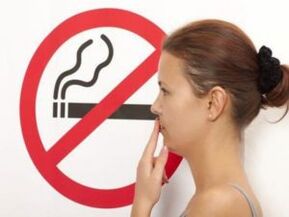
And heavy smokersafter experiencing emotions, for sure, will reach for a cigarette, thereby trying to relax a little.
This is how they think to ease the pain that usually starts to build up as the anesthetic wears off.
This is just not worth doing.Below in the article we will deal with the question whether it is possible to smoke after tooth extraction and why is it strictly forbidden to do it immediately after the procedure? We will give recommendations for various cases.
The effect of cigarette smoke and nicotine on recovery after tooth extraction
Keep in mind!The composition of cigarette smoke contains a large amount of chemical elements and compounds that harm the body as a whole and, at the same time, interfere with the wound healing process.
Nicotine is a strong irritant to the edges of the socket left after the operation.
It constricts the blood vessels that carry blood to the wound.
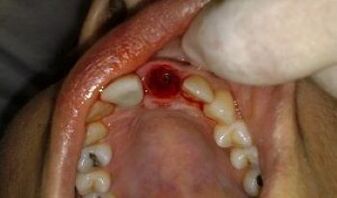
The longer and more violently the tobacco acts on the wound, the longer it will not heal.
Smoking also has a negative effect on the blood clotting process.
As a result, the wound remains open for a long time, constantly bleeds, as a result of which the risk of its infection with various infections increases several times.
Inflammation is a consequence of infection in the wound cavity.
Its symptoms and signs: general malaise, headache, fever, redness of the gums, acute pain in it.
How long is it forbidden to smoke?
Worth noting!Dentists recommend observing at least a minimum smoking cessation period after tooth extraction - 2 - 3 hours.
After this time, you can smoke, but only if the bleeding has completely stopped.
When can I smoke after wisdom tooth extraction?
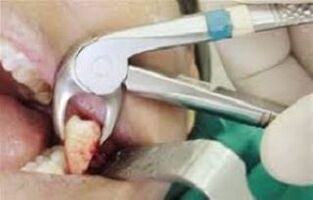
Extraction of a wisdom tooth (figure eight) is a long and painstaking process.
This tooth is characterized by a wide, overgrown root, often curved, which sometimes has to be removed in parts.
An extensive wound remains on the gum after such an operation,on which dentists often suture and drain.
Also, doctors often prescribe antibiotics to prevent inflammation.
Stay informed!When leaving the medical office, a smoker should definitely consult with a dentist about when to smoke the first cigarette and start eating.
The doctor's answer will directly depend on the patient's state of health, the course of the operation, etc. As a rule, all recommendations are purely individual.
How long should I smoke after stitches?
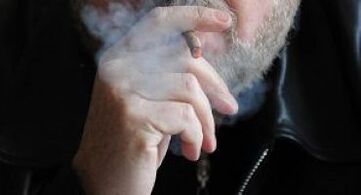
If, after the extraction, the doctor sutures, then he may recommend to make the first puff not earlier than after 2 - 10 days.
This time is necessary for full wound healing and resorption of postoperative sutures.
In case of non-compliance with the recommended break in smoking, postoperative complications may develop.
Even a single cigarette can delay wound healing.
How long does it take to smoke? The ideal option is not to return to the addiction for 2 to 10 days.
Hookah and e-cigarettes
Hookah, like electronic cigarettes (vaping), is contraindicated in patients for at least 3 hours after surgery. Heated smoke or steam irritates soft tissue and may cause bleeding to recur.
What consequences can you face?
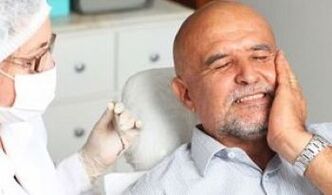
Each patient has the right to decide independently whether to smoke or not. But before taking the first puff, it is advisable for every smoker to get acquainted with the consequences that are possible if the dentist's recommendations are not followed.
Most of them can lead to serious health problems, and some can even be fatal.
There are 3 complications especially dangerous for the smoker:
- Osteomyelitis.
Purulent inflammation of the bone tissue as a result of infection. This disease is very serious and, if not properly treated, can lead to the death of the patient. - Alveolar osteitis(dry socket).
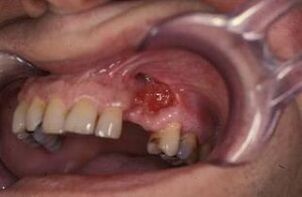 A condition when there is no blood clot in the fossa, which is a natural barrier for infections to enter the hole. A blood clot can "pop out" under the influence of nicotine, a feature of which is its ability to increase blood pressure inside the vessels.
A condition when there is no blood clot in the fossa, which is a natural barrier for infections to enter the hole. A blood clot can "pop out" under the influence of nicotine, a feature of which is its ability to increase blood pressure inside the vessels. - Alveolitis.
Inflammation of the socket of the tooth and nearby tissues after its removal. The area of the hole begins to hurt a lot, swells and becomes covered with a gray coating, the patient's temperature rises, the submandibular lymph nodes increase, food intake is impossible due to acute pain.
What else is not recommended?
Need to know!After tooth extraction, several recommendations should be followed:
- Brush your teeth, rinse your mouth for 24 hoursafter the operation. Such events can provoke the "washing out" of the blood clot.
- Take a hot bath, visit a bathhouse, a sauna.A high temperature can cause an increase in pressure and, as a result, renewed bleeding.
- Load yourself physically.Exercise can also trigger hypertension.
- Drinking alcoholI am another factor that can cause an attack of hypertension and, as a result, bleeding from a wound.
- Eat immediatelyafter extraction: it is best to wait 2 - 3 hours.
- It is forbidden for the dishes to be hot, cold, which can injure the oral cavity. It is also better to abstain from spicy foods. You can not open your mouth wide after suturing: muscle tension can provoke their discrepancies.
- It is better not to drive a vehicle,because the pain relievers used during the extraction can make you drowsy.

Important! After the extraction of the tooth, the patient can apply ice to the cheek to relieve pain, take painkillers recommended by the doctor (except aspirin).
Not earlier than after 20 minutes it will be possible to remove the tampon soaked in antiseptic, provided the bleeding has stopped completely.
If the tampon stays in the wound longer, it can become an ideal breeding ground for bacteria.
Read also articles that will help to study the issue in more detail,which will make prevention faster and better:
- how to get rid of the smell of cigarettes from the mouth;
- toothpaste for smokers;
- language and smoking;
- smoking plaque on teeth.
Reviews
Below are some reviews. If you have something to say - leave your feedback in the comments below the article, it will be useful to our readers.
I was tortured by a wisdom tooth: I was constantly sick, began to collapse. My dentist recommended removal as the only option.
I agreed right away: I'm tired of constantly drinking painkillers. The operation went well, but the stitches still had to be stitched.
But what was my surprise when the doctor mentioned smoking cessation! And I am a heavy smoker, a cigarette helps to cope with irritation, anger, even pain.
Why should I have resisted a drag right after leaving the hospital! But willpower prevailed. As a result, the healing process was successful.
My tooth was pulled out. The doctor, giving postoperative recommendations, drew my attention to the fact that it is better to abstain from smoking for 2 - 3 hours.
I couldn’t resist even half an hour - I lit a cigarette: the blood began to ooze from the wound almost immediately and did not stop.
I had to go to the doctor again for help. It's good that I returned to the hospital, because everything could have ended much more sadly.
The dentist said that there are great risks of infection in the wound due to the fact that nicotine eats away at its edges and does not allow it to drag on.
Baths of herbal infusions are capable of alleviating the patient's condition and accelerating the healing process.
A bag of chamomile is poured with boiling water, infused for half an hour and cooled to room temperature. The infusion should be taken into the mouth and kept for about two minutes without rinsing.
No matter how strong the addiction to smoking, you should still use common sense.
The correct and only correct step is to follow all the doctor's recommendations.
Otherwise, the negligent patient will have to pay too high a price for disobedience - the price of his own health. Is the nicotine puff worth it?























